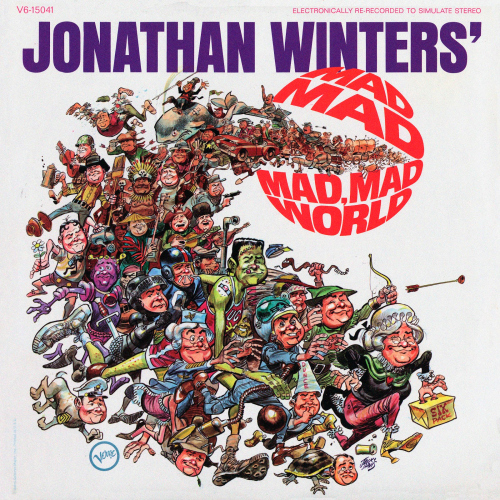Jonathan Winters, the rubber-faced comedian whose unscripted flights of fancy inspired a generation of improvisational comics, and who kept television audiences in stitches with Main Street characters like Maude Frickert, a sweet-seeming grandmother with a barbed tongue and a roving eye, died on Thursday at his home in Montecito, Calif. He was 87.
His death was announced on his Web site, JonathanWinters.com.
Mr. Winters, a rotund man whose face had a melancholy basset-hound expression in repose, burst onto the comedy scene in the late 1950s and instantly made his mark as one of the funniest, least definable comics in a rising generation that included Mort Sahl, Shelley Berman and Bob Newhart.
Mr. Winters was at his best when winging it, confounding television hosts and luckless straight men with his rapid-fire delivery of bizarre observations uttered by characters like Elwood P. Suggins, a Midwestern Everyman, or one-off creations like the woodland sprite who bounded onto Jack Paar’s late-night show and simperingly proclaimed: “I’m the voice of spring. I bring you little goodies from the forest.”
A one-man sketch factory, Mr. Winters could re-enact Hollywood movies, complete with sound effects, or create sublime comic nonsense with simple props like a pen-and-pencil set.
The unpredictable, often surreal quality of his humor had a powerful influence on later comedians like Robin Williams but made him hard to package as an entertainer. His brilliant turns as a guest on programs like “The Steve Allen Show” and “The Tonight Show” — in both the Jack Paar and Johnny Carson eras — kept him in constant demand. But a successful television series eluded him, as did a Hollywood career, despite memorable performances in films like “It’s a Mad, Mad, Mad, Mad World,” “The Loved One” and “The Russians Are Coming, the Russians Are Coming.”
Jonathan Harshman Winters was born on Nov. 11, 1925, in Dayton, Ohio, where his alcoholic father (“a hip Willy Loman,” according to Mr. Winters) worked as an investment broker and his grandfather, a frustrated comedian, owned the Winters National Bank.
“Mother and Dad didn’t understand me; I didn’t understand them,” he told Jim Lehrer on “The NewsHour With Jim Lehrer” in 1999. “So consequently it was a strange kind of arrangement.” Alone in his room, he would create characters and interview himself.
The family’s fortunes collapsed with the Depression. The Winters National Bank failed, and Jonathan’s parents divorced. His mother took him to Springfield, where she did factory work but eventually became the host of a women’s program on a local radio station. Her son continued talking to himself and developed a repertory of sound effects. He often entertained his high school friends by imitating a race at the Indianapolis Motor Speedway.
A poor student, Mr. Winters enlisted in the Marines before finishing high school and during World War II served as a gunner on the aircraft carrier Bon Homme Richard in the Pacific.
After the war he completed high school and, hoping to become a political cartoonist, studied art at Kenyon College and the Dayton Art Institute. In 1948 he married Eileen Schauder, a Dayton native who was studying art at Ohio State. She died in 2009. His survivors include their two children, Jonathan Winters IV, of Camarillo, Calif., known as Jay, and Lucinda, of Santa Barbara, Calif.; and several grandchildren.
At the urging of his wife, Mr. Winters, whose art career seemed to be going nowhere, entered a talent contest in Dayton with his eye on the grand prize, a wristwatch, which he needed. He won, and he was hired as a morning disc jockey at WING, where he made up for his inability to attract guests by inventing them. “I’d make up people like Dr. Hardbody of the Atomic Energy Commission, or an Englishman whose blimp had crash-landed in Dayton,” he told U.S. News and World Report in 1988.
After two years at a Columbus television station, he left for New York in 1953 to break into network radio. Instead he landed bit parts on television and, with surprising ease, found work as a nightclub comic.
A guest spot on Arthur Godfrey’s “Talent Scouts” led to frequent appearances with Jack Paar and Steve Allen, both of them staunch supporters willing to give Mr. Winters free rein. Alistair Cooke, after seeing Mr. Winters at the New York nightclub Le Ruban Bleu, booked him as the first comedian to appear on his arts program “Omnibus.”
In his stand-up act, Mr. Winters initially relied heavily on sound effects — a cracking whip, a creaking door, a hovering U.F.O. — which he used to spice up his re-enactments of horror films, war films and westerns. Gradually he developed a gallery of characters, which expanded when he had his own television shows, beginning with the 15-minute “Jonathan Winters Show,” which ran from 1956 to 1957. He was later seen in a series of specials for NBC in the early 1960s; on an hourlong CBS variety series, “The Jonathan Winters Show,” from 1967 to 1969; and on “The Wacky World of Jonathan Winters,” in syndication, from 1972 to 1974.


